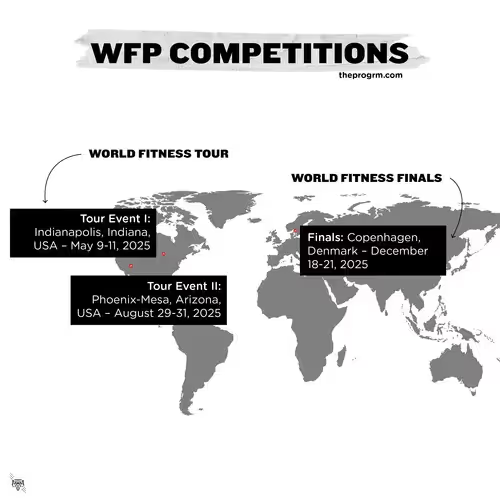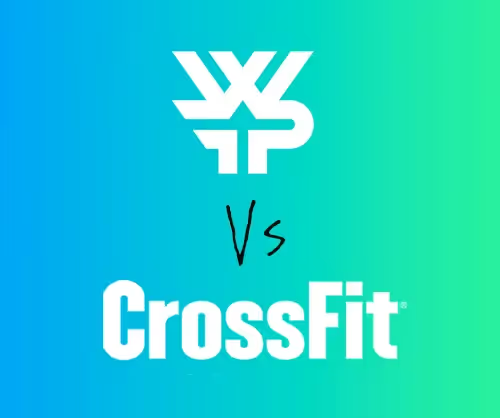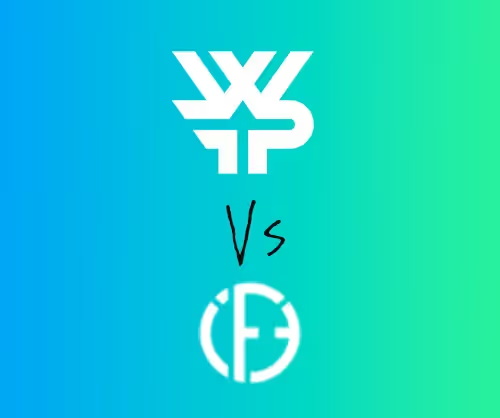World Fitness Project
Discover the World Fitness Project, a new competitive league transforming functional fitness, debuting in 2025 with exciting events!



Discover the World Fitness Project, a new competitive league transforming functional fitness, debuting in 2025 with exciting events!


The World Fitness Project (WFP) is a new competitive fitness league announced in 2024, with its inaugural year planned for 2025.
Created by CrossFit Games veteran Will Moorad alongside Isabella and Jackson Terry, the WFP aims to transform the world of functional fitness by providing a structured, inclusive, and globally accessible platform for athletes.
With its innovative format and focus on elite competitors and aspiring athletes, the WFP seeks to set a new benchmark in fitness competition.
The World Fitness Project is poised to revolutionise the competitive fitness landscape.
By offering professional-level contracts, opportunities for emerging athletes, and a globally accessible competition format, the WFP promises to elevate the sport and create a new standard for functional fitness events.
With a star-studded roster and innovative approach, the WFP is set to become a must-watch league in 2025 and beyond.
The WFP will feature a season-long competition comprising three key stages:


These events will feature the signed professional athletes competing alongside challengers who qualify through online preliminaries to earn points and secure their standings for the season.
The WFP has carefully structured its schedule to avoid direct clashes with the CrossFit Games Final. However, the first WFP Tour event planned for May (Indianapolis, Indiana) will clash with the French Throwdown.

The WFP has already signed some of the biggest names in functional fitness to its Pro Division for the 2025 season. Here's what we know so far…
Men
Women
Jay Crouch
Haley Adams
Luka Đukić
Manon Angonese
Victor Hoffer
Danielle Brandon
Jayson Hopper
Aimee Cringle
Jelle Hoste
Bethany Flores
Ricky Garard
Alex Gazan
Björgvin Karl
Guðmundsson
Emma Lawson
Roman Khrennikov
Arielle Loewen
Jonne Koski
Emma McQuaid
Sam Kwant
Alexis Raptis
Guilherme Malheiros
Emily Rolfe
Travis Mayer
Paige Semenza
Justin Medeiros
Maddie Sturt
Saxon Panchik
Austin Hatfield
Emma Tall
Dallin Pepper
Brooke Wells
Chandler Smith
Sydney Wells
James Sprague
Lucy Campbell
Pat Vellner
Dani Speegle
Noah Ohlsen
Olivia Kerstetter
Jeffrey Adler
Laura Horvath
These athletes are among the 20 men and 20 women selected to hold professional contracts for the 2025 season, granting them automatic invitations to the WFP's events throughout the year.
They represent a mix of seasoned CrossFit Games competitors and emerging talents, ensuring a dynamic and competitive season.

If you're not part of the Pro Division, you can still compete in the WFP by participating in the Challenger Qualifier.
This online event takes place over one week and consists of three workouts.
The top 10 male and female athletes from the qualifier will earn a spot in the Tour events, allowing them to compete alongside the pros and accumulate points towards the Finals.
The WFP has announced professional contracts worth up to $100,000 for its signed Pro Division athletes.
Additional prize money will be awarded throughout the Tour events and the Finals, rewarding top performances and incentivising athletes at every competition stage.
Exact prize amounts for the Tour and Finals have yet to be disclosed but are expected to rival other major functional fitness competitions.
The WFP is financially backed by the Gillette family, with Beth Gillette serving as the registered agent for World Fitness Project, LLC. Beth is a Masters CrossFit Games athlete and the CEO of PowerGrid Services.
No, the World Fitness Project (WFP) is not branded as a CrossFit competition. While the WFP was founded by individuals with strong ties to the CrossFit community, it is an independent competitive fitness league. The WFP is designed to offer a distinct platform for functional fitness athletes, separate from the CrossFit Games and the broader CrossFit ecosystem.
Branding and Licensing:
Competition Structure:
Athlete Inclusion:
While the International Functional Fitness Federation (iF3) and the iF3 World Championships are similar to the World Fitness Project (WFP) in that both focus on functional fitness competitions, they differ significantly in structure, purpose, and approach.

Organisational scope and goals
iF3: The iF3 is the global governing body for functional fitness, aiming to standardise and grow the sport internationally. It promotes functional fitness as a recognised sport, potentially in the Olympics.
WFP: The WFP is a competitive fitness league designed as an independent professional platform for elite and aspiring athletes. It prioritises innovation and creating a sustainable, inclusive league.
Competition Structure
iF3: Structured like traditional international sporting events. Athletes represent their countries. Competitions adhere to a defined rulebook focusing on fairness and standardisation. Includes tests across six areas: endurance, strength, body weight, skill, mixed modal, and power.
WFP: It's a professional league with a season-long structure. Features Pro Divisions (signed athletes) and Challenger Qualifiers (aspiring athletes). It includes tour events and culminates in the World Fitness Finals.
Emphasises both individual competition and building a global fitness community.
Athlete Participation
iF3: Open to athletes who qualify via national championships or specific pathways established by the federation. Emphasises amateur and national representation.
WFP: Features signed professional athletes under contracts worth up to $100,000. Allows broader access through online Challenger Qualifiers, enabling individuals to compete alongside pros.
Event Scale and Focus
iF3: Focused on international representation and standardising functional fitness. Appeals to athletes seeking to represent their country on a global stage.
WFP: Focused on professionalising the sport with a league-style format.
It aims to create a sustainable ecosystem for elite athletes while engaging a wider audience.
Sponsorship and Commercialisation
iF3: Operates more as a federation, with less emphasis on commercial sponsorships.
WFP: Is backed by high-profile sponsors like Nike and Rogue Fitness, focusing on athlete support and commercial appeal.
While the iF3 and WFP both promote functional fitness, the iF3 focuses on standardisation and global recognition of the sport, aligning with traditional sports federation models.
The WFP is akin to a professional sports league, providing opportunities for elite athletes to compete professionally in a season-long format. They complement each other differently, with the iF3 fostering grassroots development and the WFP pushing the sport's professional boundaries.
The World Fitness Project (WFP) has not released specific details regarding live streaming or broadcast options for their 2025 events. However, in a recent interview, WFP co-founder Will Moorad mentioned that they are considering outsourcing the production of live streams and media coverage for their competitions.
Given this, the WFP is likely to provide live-streaming options for its events, either through its official website or via platforms like YouTube or social media channels. We will update this page when we know more.